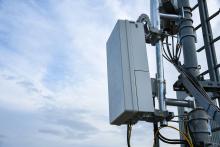The ability for enterprises to set up and manage their own private 5G network has been a red-hot topic of discussion this past year. And it’s only getting hotter.
Until recently, the private 5G market has included telecommunications system behemoths along with lesser-known innovators that are battling to get the attention of enterprise customers. The stiff competition that has existed in the market up to this point shows the potential that some believe private 5G has in the enterprise IT space. However, now that AWS has just thrown their hat into the ring, it’s time for everyone to sit up and take notice.
AWS announces their foray into private 5G services
At the annual AWS re:Invent conference last week, AWS CEO Adam Selipsky announced in his keynote address that the service provider will be launching a private 5G network service that leverages cloud-native principles using edge computing technology. According to Selipsky, the AWS Private 5G service is perfect for ultra-low latency wireless use-cases.
During his address, the AWS CEO spent several minutes discussing multiple enterprise use cases such as robotic manufacturing, tablets in factories and warehouses, smart buildings, and shipping and delivery fleets. “All these new use cases require consistent, reliable connectivity,” stated Selipsky. He then went on to make the case for private 5G being the solution to this enterprise network problem:
- "Today, most enterprises use local wired Ethernet or WiFi networks for their connectivity. These systems weren’t designed to support connecting all these things. Wired networks perform well, but they’re expensive to deploy and upgrade. And they don’t extend very well to mobile devices. Enterprise WiFi is easy and cheap to use, but it has range and coverage issues. So, this is one of the reasons why the promise of [private] 5G is so exciting."
What it all means for the private 5G market
For those that have been following the potential of private 5G use cases in the enterprise, what Selipsky is saying is really nothing new. Innovative leaders in the LTE/5G space like Celona Inc. are already ahead of the game from an enterprise integration perspective. For example, NTT recently unveiled its private 5G network as a service (NaaS), powered by Celona technology, designed to address key enterprise requirements for lower latency, deterministic wireless connectivity for critical applications.
“AWS is looking for ways to get the enterprise to consume more edge compute services and views 5G as another application to increase revenue,” said Ozer Dondurmacıoğlu, VP of Marketing at Celona.
“While we completely agree with AWS that there is significant pent-up enterprise demand for more predictable wireless connectivity, we believe that the winning model will be delivering 5G as a fully optimized, end-to-end solution within an IT-friendly framework already familiar to businesses,” he said.
Still, the fact that AWS has entered the private 5G market in such a big way shines a bright light on the intrinsic value that 5G cellular technology will have within the enterprise market and the big bet that this market will explode. Their entrance effectively validates that legitimate private 5G use cases indeed exist and those businesses will soon find the need for a private mobile network to run along side their existing wired- and WiFi-based LANs
AWS’ differentiating private 5G deployment models
AWS has taken a somewhat similar, yet different approach to their service model. The company plans on selling customers third-party 4G/5G radio access network (RAN) hardware as well as core 5G software and SIM cards, with all the software running within their own AWS edge compute offerings.
From a management standpoint, AWS will use their own centralized platform deployed at the edge to unify and automate the private 5G RAN for orchestration purposes. Thus, while the orchestration platform can perform similar duties compared to competitors, it’s not a complete “end-to-end” solution that many enterprises are accustomed to operating. While this model does come with its own set of benefits, it’s too early to know whether IT shops will be comfortable enough to deploy it.
Enterprise WiFi is a good example how enterprise customers are likely expecting to purchase, implement and manage new private 5G networks. Most enterprise WiFi deployments use a single vendor for all hardware, software, and centralized management purposes. IT departments tend to prefer this single-vendor approach because it’s simple and something over which they have complete control. Because the WiFi vendor controls the wireless LAN including all components and software, it’s much easier to control performance and reliability outcomes as opposed to a WiFi network that consists of hardware and software coming from multiple vendors. This same is being applied to private 5G networks that will be built and managed right alongside existing corporate wired and WiFi enabled LANs. So, this is something that enterprise IT shops must consider when evaluating the various options that are available to them.
More choice is always a good thing
Ultimately, no two enterprises are created equal. Each has distinctly different networking requirements that, by definition, demand greater choice and flexibility.
The emergence of AWS and its new 5G NaaS offering now gives enterprise more options when considering how, when, and where best to deploy 5G. IT thought leaders will undoubtedly be being looking hard and fast at precisely how this technology can best deployed within their organizations–viewing the AWS entrance into the private 5G market as an all-around good thing for the market and perfect timing as we enter 2022.
Related content:
Get Moving: 3G Sunsetting Deadline is Rapidly Approaching
Managing Mobile Devices in a New Era of 5G LANs









